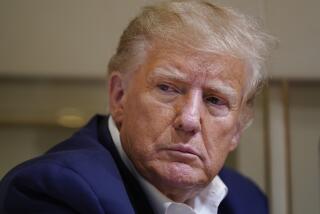New Nixon Tapes Present No Worries to Bush
- Share via
WASHINGTON — George W. Bush was worried about Richard Nixon, but he needn’t have been.
Informed that the National Archives was releasing a new batch of Watergate-era tapes Thursday, a top aide to the Texas governor suspected that the fine hand of the White House might be involved. Was there an embarrassing conversation between President Nixon and Bush’s father from long ago that was about to be exposed less than two weeks before the Nov. 7 election?
When the tapes were made public, the voice of former President Bush, then ambassador to the United Nations, was heard telling Nixon that “I don’t like the family living here in New York.” His voice appeared on only two other tapes among the 420 hours of recordings secretly made by Nixon from August to December 1971.
Ari Fleischer, Bush’s campaign spokesman, confirmed to reporters that “we did call [the archives] to express concern” that the tapes’ release might be an effort to discredit Republicans. Fleischer said that he harbors “an ongoing concern about whether this administration is going to create external events to influence the outcome of this election.”
Bush’s running mate, Dick Cheney, already had sharply criticized Clinton Cabinet members for speaking out on behalf of Vice President Al Gore, the Democratic presidential nominee.
Archives spokeswoman Susan Cooper said that an intermediary for Bush had telephoned John Carlin, director of the archives, to inquire about the timing of the latest release of tapes. But Carlin informed the intermediary, Jim Cicconi, that “these tapes are being opened on a regular schedule according to the April 1995 agreement with Mr. Nixon’s heirs,” Cooper said.
The former president, who fought release of the tapes during his lifetime, died in 1994.
“I can guarantee” that the White House had no involvement in setting a date for the tapes’ release, Cooper said, calling it “an internal decision” made in consultation with John H. Taylor, executive director of the Richard Nixon Library & Birthplace in Yorba Linda.
In the phone talk about life in New York, recorded in late 1971, Nixon and Bush chatted about the Dallas Cowboys--Bush’s home-state team--and Nixon asked his U.N. ambassador if he liked “fighting that New York society crowd.”
“I don’t like that part of it, and I don’t like the family living here in New York,” Bush said. But he added that “the job has been fascinating.”
In two other conversations, Nixon and Bush discussed India-Pakistan hostilities over Kashmir. The Nixon administration was not taking sides in public but was privately tilting toward Pakistan.
Nixon told Bush that “India’s hands are not clean,” and Bush agreed. “India, in spite of its sanctimony, was really the aggressor,” Bush said.
Nixon directed the Secret Service to install a secret taping system in the White House and at Camp David in February 1971, which included recording devices in the Oval Office and on telephones used by the president.
Nixon ordered the system dismantled in July 1973, after its existence was revealed in testimony before the Senate Watergate Committee. However, some of the 3,700 hours of recordings contained evidence of criminality by Nixon in attempting to thwart grand jury inquiries into the Watergate scandal and led to the president’s resignation.
Shortly after his resignation in August 1974, Congress seized all of Nixon’s tapes and presidential papers and turned them over to the National Archives for safekeeping. Last summer, the government agreed to pay $18 million to Nixon’s estate to settle claims that Congress had expropriated Nixon’s property without compensating him.
More to Read
Sign up for Essential California
The most important California stories and recommendations in your inbox every morning.
You may occasionally receive promotional content from the Los Angeles Times.













